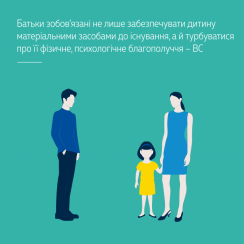Contact center of the Ukrainian Judiciary 044 207-35-46

The Criminal Cassation Court within the Supreme Court upheld the cassation appeals of the prosecutor and the victim requesting that the appellate court's judgment be cancelled and that a new trial of criminal proceedings on charges against a person for persistent failure to perform duties related to the care of a child (Art. 166 of the Criminal Code of Ukraine) be instituted before the court.
According to the verdict of the local court, the man was found guilty and convicted for having persistently evaded the duties related to the care of his minor daughter during 2012-2013: he did not take care of her health, physical and moral development, repeatedly provoked family conflicts. The court of appeal cancelled the verdict, and the criminal proceedings under Art. 166 of the Criminal Code of Ukraine were closed due to the absence of elements of the criminal offence in the act concerned (paragraph 2, part 1 of Art. 284 of the CPC of Ukraine).
The Criminal Cassation Court within the Supreme Court pointed to the fact that the opinion of the court of appeal was not based either on the law of Ukraine on criminal liability or on the factual circumstances of the proceedings.
Thus, given the disposition of Art. 166 of the Criminal Code of Ukraine, the responsibility of a special subject (parents, guardians or custodians) arises in the case of the commission of an intentional act in the form of action (physical and psychological violence, abuse, etc.) and inaction, provided that the obligation to take care of a child or a person under guardianship or custody is flagrantly breached, and in the event of grave consequences for the victim.
At the same time, taking into account the provisions of law, parents are obliged not only to provide the child with living, educational, domestic and leisure facilities, as indicated by the court of appeal, but also to take care of the child's physical, psychological and social well-being. The main condition for a child's development is the ability to live harmoniously in a changing total environment (the Declaration of the Rights of the Child, adopted by UN General Assembly Resolution 1386 (XIV) of November 20, 1959, the Convention on the Rights of the Child, Ukraine, of February 21, 1990, Articles 150, 180 of the Family Code of Ukraine).
In other words, providing the child with material means of subsistence alone is not evidence of the fulfillment by parents of their duties.
At the same time, the court of first instance found that the man had not fulfilled his duties related to the mental development of the child. This manifested itself in systematic psychological violence (quarrels and humiliation of his wife and daughter), which led to the child's psychotrauma.
Circumstances that indicate the persistent failure to perform duties related to the care of a child or a person under guardianship or custody may include, in particular, their duration, systemic nature, repetition, etc.
In the proceedings, the local court found it proven that the person's actions against his daughter were repeated and caused the child's shock, stress and so on. In this connection, she was treated by a psychologist and a psychiatrist, as well as by medication. In addition, every quarrel provoked by the man led to the deterioration of his daughter's mental health, which he was aware of, but continued his illegal actions. As a result, the victim suffered severe consequences - a long-term health disorder.
Such actions of a person confirm their persistent nature and may indicate that he had direct intent to commit a criminal offence, and therefore it is incorrect for the court of appeal to conclude that there is no subjective element of a crime in the actions of the accused, under Art. 166 of the Criminal Code of Ukraine, in the form of intent.
Resolution in case No. 450/1146/14-к (proceedings No. 51-3650км21) – https://reyestr.court.gov.ua/Review/100957076.
This and other legal positions of the Supreme Court can be found in the Database of Legal Positions of the Supreme Court - lpd.court.gov.ua/login.